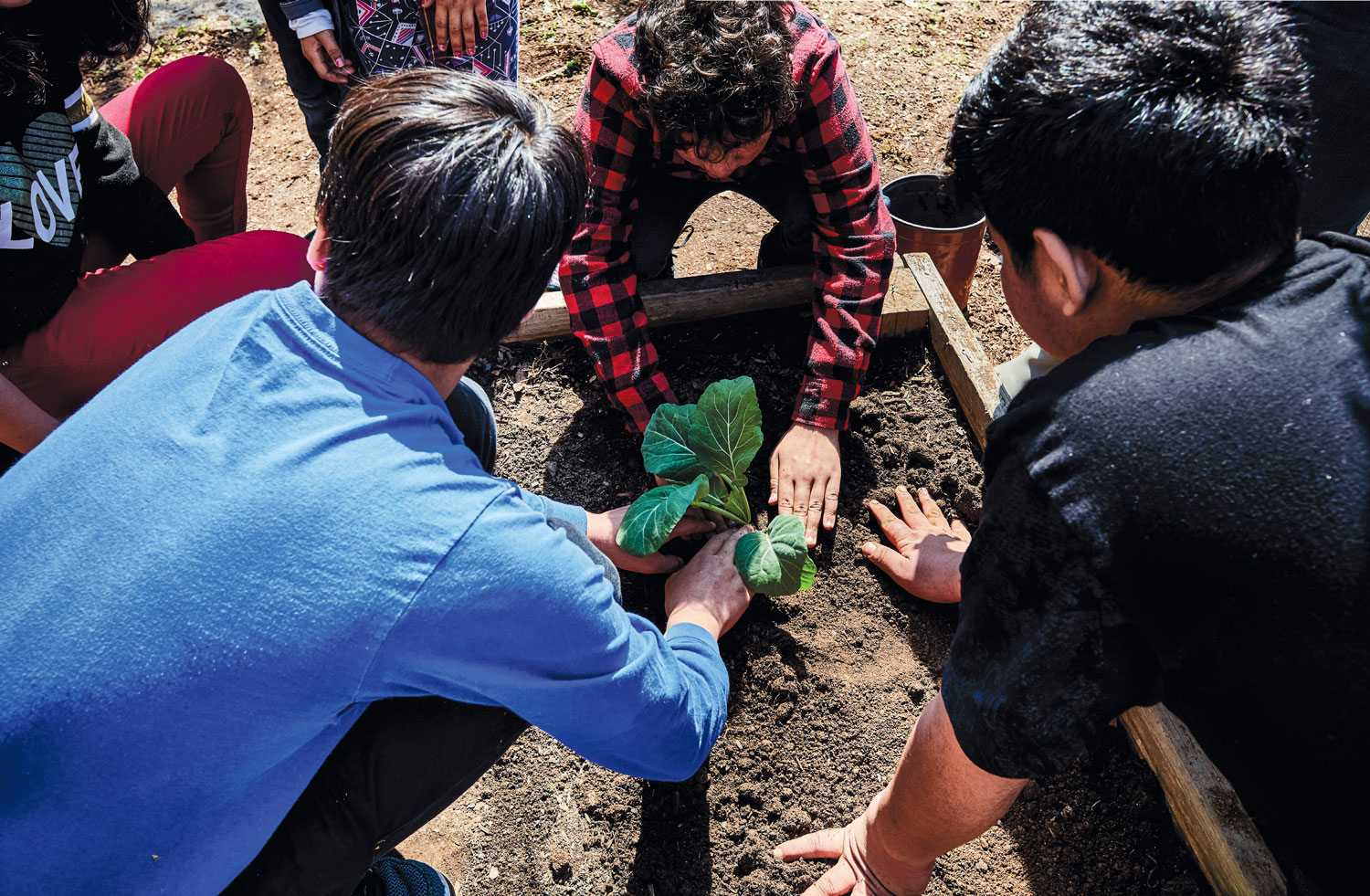Farm for the City
A Season-Long Dialogue on Food Security
In a compact garden space in the Fairhill section of North Philadelphia, conversation echoed early on a spring Saturday. Inside, young plants were being united with soil, fresh green juxtaposing dark compost. Tending them were gardeners whose own youthful laughter was punctuated by exchanges in Spanish. How far apart should the tomatoes be planted? Do you water the plant or the dirt? It was the beginning of the season for the Youth Advocate Program, part of an international organization that empowers youth affected by violence, and everything started from the ground up: the gandules (pigeon peas) and cilantro, the tomatoes and basil.
Community organizer and garden leader Charito Morales moved through the space, issuing encouragement and instruction. Meanwhile, Charlyn Griffith of Soil Generation, a black- and brown-led organization that advocates for local control of land and food, advised the teens with a faint smile. “You have to get down low,” Griffith said. “The plant wants to be in community with you.” The teens knelt closer.
Juan Nazario, a block captain in the neighborhood, watched as they worked: teens from Honduras and Colombia, recent evacuees from Puerto Rico, his own son. A mural, he mused, would be amazing here. Griffith’s eyes lit up and she pulled out her cell. Perhaps they could make that happen.
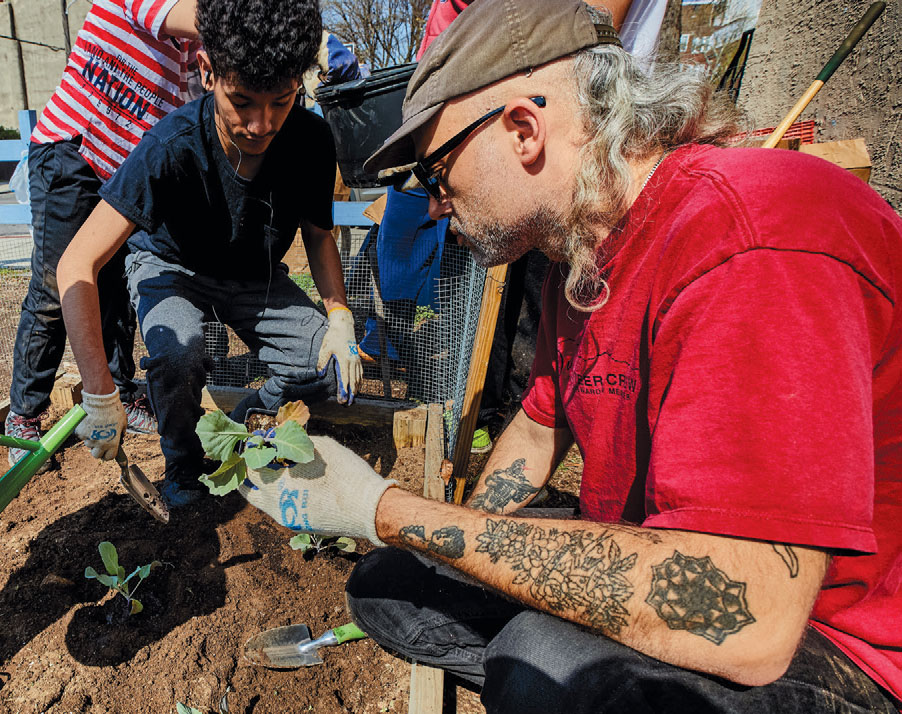
SHARED SPACE, SHARED WISDOM
When we talk about urban gardens, boutique farm stands in hot real estate markets claim a lot of airtime. Yet urban agriculture has a long history in Philadelphia, and it’s hardly confined to those fashionable neighborhoods. This summer, a project called Farm for the City will amplify that story.
Several miles south of Fairhill, Thomas Paine Plaza is normally a vista of pale stone flanking the Municipal Services building. Yet as the sun beats down, a nautilus of vertical growing containers now rises, luring passersby inside.
The crops that grow there evoke the bounty of Philly’s urban farms. There’s okra and greens: collards, callaloo, culantro. There’s Burmese rat-tail radish and purple Kingsessing beans, an heirloom that grew here well before the Europeans colonized. It’s an enchanting vista. Yet deeper inside, voices buzz.
While it is a garden, the intended harvest at Farm for the City is dialogue. A farm-meets-art installation with a human heartbeat, it is a project of the Pennsylvania Horticultural Society, in partnership with Broad Street Ministry and funded by The Pew Center for Arts & Heritage.
The project showcases the longstanding food justice work of gardeners and farmers who are growing food for their communities inside city limits. With more than one in four Philadelphians experiencing food insecurity and threats to SNAP looming, it’s a timely topic—but not a new one.
“There’s a deep Philadelphia history of frontline communities working to address issues related to land access, social equity and food insecurity, in part through deep-rooted growing cultures,” says Griffith, program curator. An artist and a grower, her goal is to lift up those voices.
“We need to look to communities that are experiencing this crisis for answers and for expertise.”
There’s hardly a more visible or central location in which to convene them than a public space steps from City Hall.
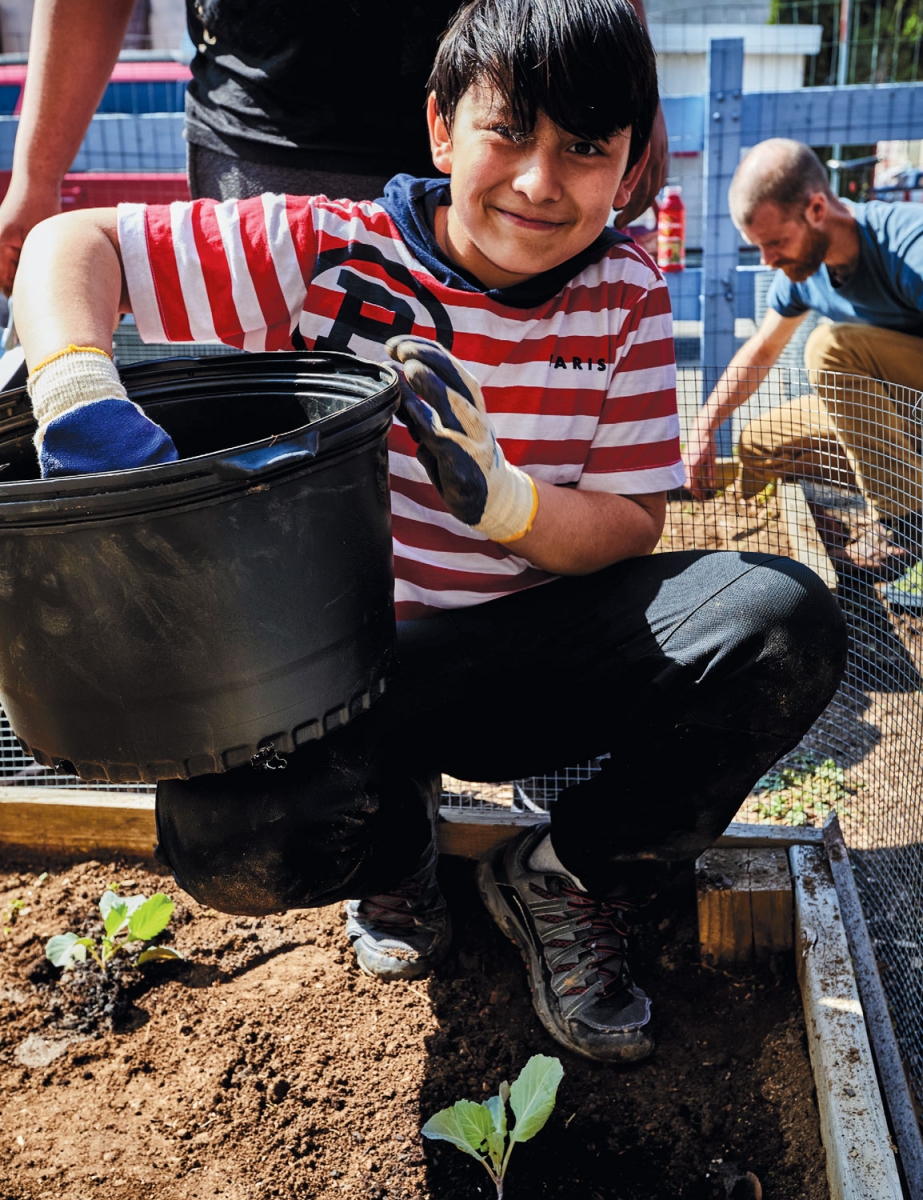
“You have to get down low,” Griffith said. “The plant wants to be in community with you.” The teens knelt closer.
FROM SOIL TO HARVEST
Following a season’s cycle, every aspect of Farm for the City is designed to engage the community—growers, city officials, passersby. In that sense, it reflects PHS’s approach. “PHS has a more than 40-year history of working in support of people of all backgrounds in Philadelphia who want to come together to create and sustain community gardens,” says the Society’s executive director Matt Rader. “You have this wonderfully diverse and rich grassroots system that’s producing tremendous social good.”
In donating more than a quarter million plants and training to Philadelphia growers annually, PHS has seen that work firsthand. Through the PHS City Harvest program, for example, more than 140 gardens and farms make direct produce donations to organizations serving families in need.
Independent programs also abound. Take the Youth Advocate Program in Fairhill. Not only are the young gardeners gaining leadership skills, they’re also learning to grow food for themselves in a neighborhood where a single bodega banana can cost $1.00.
The farm showcases these efforts through daily talks, classes and other events. “Food and land: Just like a lot of other things that bring people together, it’s a real mirror for society to look at how we are failing each other in very real ways.” Griffith says. Working together, people have long created solutions rooted in creativity and imagination.
Farm for the City, then, is an invitation—a calling in to acknowledge and build on that legacy. Art parties celebrate gardens as a creative space. Workshops like Soil Secrets with Dr. Cynthia Hall or homesteading with Nyambi Royster will spread knowledge. Community dinners will serve as a forum on food insecurity and community revitalization. From the soil, new ideas arise.
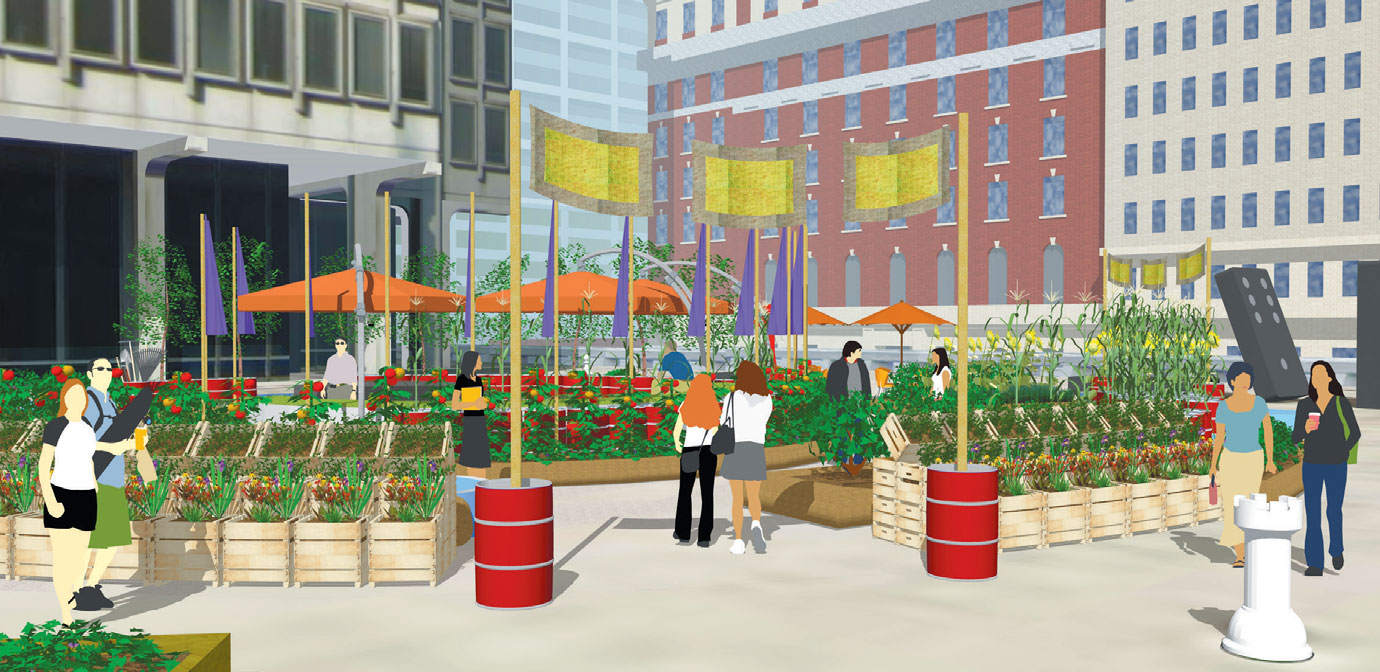
Rendering of Farm for the City, open this summer in Thomas Paine Plaza.
Rendering by Think Green and Viridian Landscape Studio.
FULL CIRCLE
Griffith says it’s important to note the difference between food insecurity, individuals going hungry, and food sovereignty, whole communities challenging the effects of racism and classism in the food system.
As a member of the Park Slope Food Co- Op in New York, she examined the food system as a young artist. When she had her children and moved to Philly, things came full circle. “Making the choice to have my children at home [and not in a hospital] opened me up to what it meant to be sovereign.” She realized that there was value not only in having access to food, but also in the ability to grow your own. Joining Soil Generation, which won a 2017 SustainPHL award from Green Philly for its land access work, felt like a homecoming.
“The guiding question is: How can we make this better for our guests? Everybody deserves to have dignity, and where I know to start is with food.”
Institutions, she says, don’t have answers. What they have are resources to support urban agriculture. That’s why PHS launched the project. They view community gardens not as a nice luxury but as a vital necessity.
“Food apartheid [lack of access to healthy food through structural inequities], plays a major part in our food system,” according to Stanley Morgan of the nonprofit Urban Creators and Life Do Grow Farm, who will act as farm educator and train apprentices to talk to passersby. “How can we work together to change some of those circumstances in black and brown communities?”
Recognizing growers’ work to answer that question by growing culturally significant crops, plants for the Farm for the City project were selected with input from Broad Street’s guests and City Harvest growers. In that sense, the crops themselves tell a piece of their story. “This [is] a story about our nation and the ability of people to maintain culture in spite of oppression,” says farm manager Dylan DeVlieger, noting the contributions of paid inmates in the Philadelphia prison system and returning citizens who assisted with the build and grow-out.
Throughout the growing season, more than 1,000 pounds of produce will be donated to Broad Street Ministry and transformed into chef-prepared dishes. Each day, an average of 210 people experiencing food insecurity or homelessness are welcomed into a sunlit sanctuary. While there, they can experience art therapy, pick up their mail and enjoy a hot, sit-down meal.
One Broad Street Ministry guest, who withheld his name, praises the effort: “The food. The atmosphere. To me, it’s almost like a five-star restaurant.” For Ms. Deborah Q. Lewis, who always claims her favorite seat, social connections are just as important. “I sleep at night just to get up in time and come down here,” she says. “When I miss a day, people come around and say, ‘I was looking for you.’”
As culinary director Steven Siebel explains, the ministry seeks to elevate the approach to service. “The guiding question is: How can we make this better for our guests? We stand by homemade and fresh. We love working with our farm partners. Everybody deserves to have dignity, and where I know to start is with food.”
It’s a thought both simple and profound.
Griffith emphasizes that everyone has a place in the sometimes uncomfortable conversation about injustice—from the teenager with limited resources in Fairhill to a Broad Street guest to a Farm for the City visitor on their lunch break.
“I want to know what the world would look like if we kept creating solutions designed by the people that are most affected,” she says. “The garden, the land and the soil, has the capacity to hold those questions.”
Farm for the City
June 15–September 28
1401 John F. Kennedy Blvd.
For more information and a schedule of on-site public forums, gardening workshops and performances, visit phsonline.org/programs/farm-for-the-city
LEND A HAND
Learn more about the organizations behind this project and how to support their work by visiting them online:
Broad Street Ministry
broadstreetministry.org
Free Haven Farms
freehavenfarms.com
Pennsylvania Horticultural Society
phsonline.org
The Lighthouse
lighthouse1893.org
The Providence Center
providencephilly.org
Soil Generation
soilgeneration.org
Urban Creators
phillyurbancreators.org
GET TO KNOW THE GROWERS
Farm for the City is all about those who grow here. Meet a few of the growers who make this urban farm so special.
Stanley Morgan
Farm Manager, Life Do Grow Farm

At Urban Creators’ Life Do Grow Farm, the recently incarcerated find job opportunities while neighbors get access to affordable produce, which can be purchased with SNAP/EBT benefits.
Nyambi Royster
Farmer & Educator, The Lighthouse

Nyambi Royster leads African heritage cooking classes and is developing a farm-based homeschooling co-op. She’ll be teaching a homesteading workshop at the farm.
Charito Morales
Garden Lead, Youth Advocacy Program
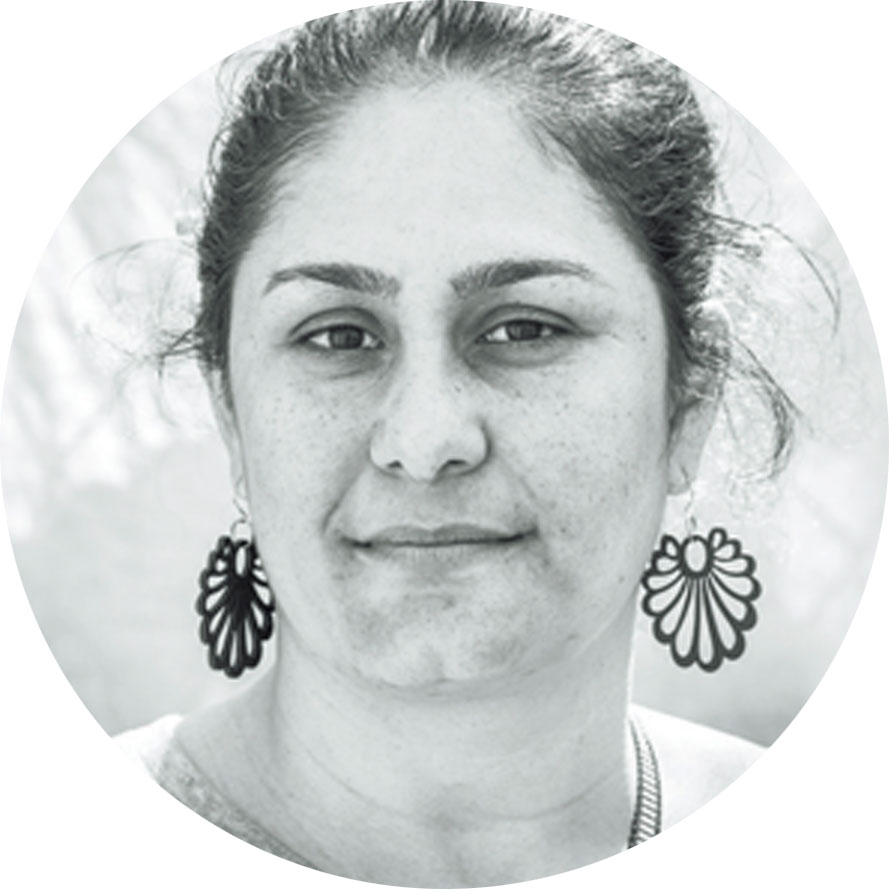
Charito Morales views gardens as a place where at-risk youth can learn food justice advocacy. Together with Philabun-dance, she also leads a food donation program that serves up to 285 people a week.
Dr. Cynthia Hall
Geochemist & Farmer
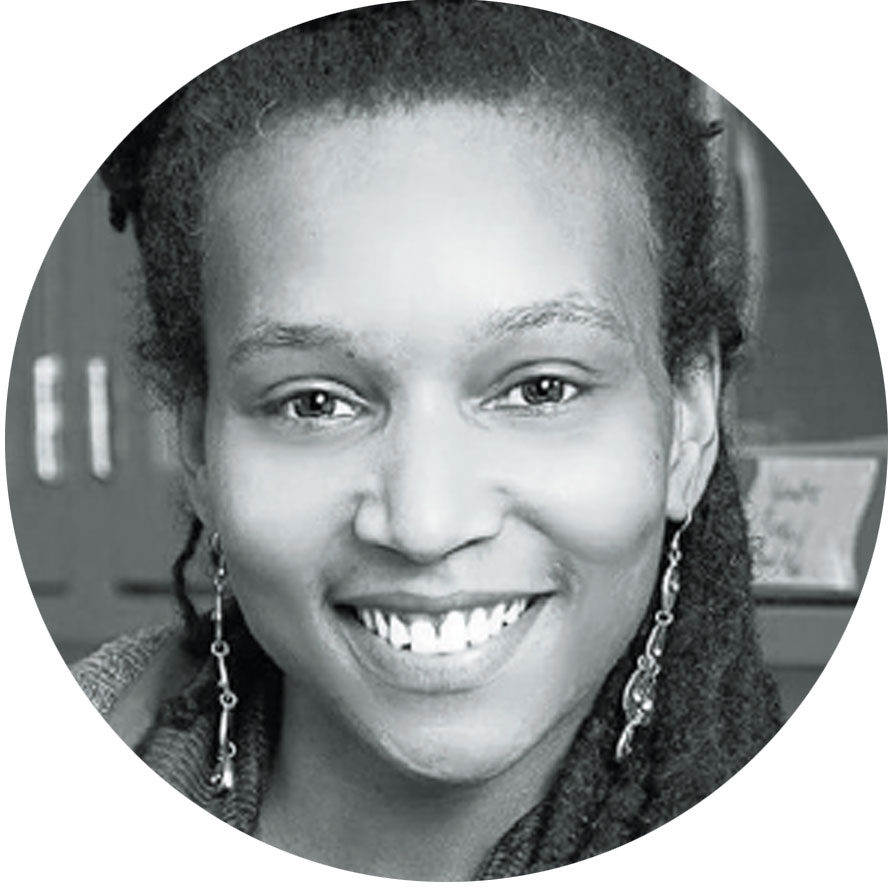
An expert in heavy metal soil contamination, Dr. Hall merges the practical and academic. As a farmer, she delivers organic CSA shares to Philly. Find her at her “Soil Secrets” workshop at Farm for the City on June 20, 6–8pm.


